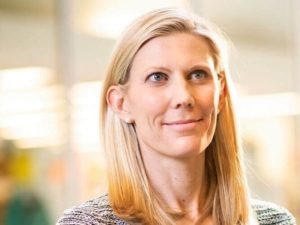What Medicine Can Learn From Doctors And Researchers With Disabilities
BY SUSIE NEILSON (Via NPR)
Bonnielin Swenor has devoted her life to studying visual impairment in older adults. But for a long time, she didn’t often discuss the motivation fueling her work — that she herself has low vision.
Swenor, an assistant professor of ophthalmology at the Wilmer Eye Institute at Johns Hopkins University, has myopic macular degeneration, a condition that leaves her with extremely limited vision. Basic tasks exhaust her visual processing power, so she has to manage her time with precision. This hasn’t stopped her from having a prolific career as a researcher and epidemiologist. But until recently, she rarely discussed her disability with her peers; she worried that they would judge or dismiss her.

Bonnielin Swenor, an assistant professor of ophthalmology, has myopic macular degeneration. It hasn’t stopped her from having a prolific career as a researcher and epidemiologist. But until recently, she rarely discussed her disability with her peers, worried they would judge or dismiss her.
Christopher Myers
Then one day, during the course of a study Swenor was conducting, something happened. “A patient said to me, ‘If you can’t talk about your disability as a researcher at the Wilmer Eye Institute, then why should I?’ ” she remembers. She has thought about this every day since. “If people in scientific and medical professions can’t be open about this, what kind of message are we sending to our patients?”
Bit by bit, Swenor started talking about her disability — and found she had a lot to say. This year she has published several articles in high-profile journals, including JAMA and the New England Journal of Medicine, sharing her experiences with disability and urging institutions to include more doctors and scientists with disabilities in their ranks.
“The exclusion of people with disabilities from the biomedical workforce undermines the goal of achieving true diversity and is a missed opportunity for science and medicine,” she wrote in the New England Journal of Medicine at the end of May. The life experiences of doctors and researchers with disabilities, she wrote, can help them treat patients and ask research questions that others miss.
Swenor is pushing for medical institutions to collect more data on individuals with disabilities in their workforces, invite people with disabilities to speak at seminars, and place faculty members with disabilities in leadership roles so they can help shape conditions and policies.
NPR spoke to Swenor about the importance of representation, the challenges she faces as a researcher with limited vision and the surprising upsides to having a disability in science.


